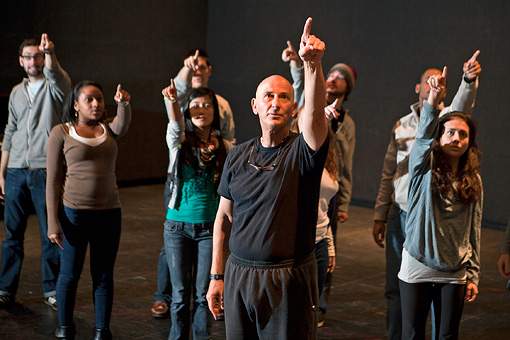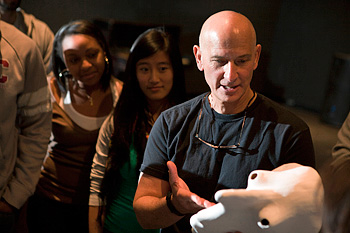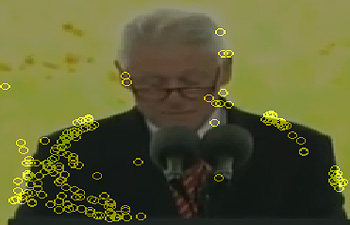
David Feldshuh, professor of acting and directing and the 2011-12 Menschel Distinguished Teaching Fellow, center, leads an activity in his fall 2011 class, Acting in Public: Performance in Everyday Life. He is developing a work.shop for faculty based on the course. Photo: Lindsay France/University Photography
David Feldshuh explores the value of teaching as performance
David Feldshuh is developing a workshop, "Enjoying the Performance of Teaching," offering tips and techniques derived from acting, directing and playwright training to boost teaching innovation and audience connection.
The professor of acting and directing in the Department of Theatre, Film and Dance has been working with colleagues in Cornell's Center for Teaching Excellence (CTE) to develop the workshop, which is informally subtitled "Did you have fun teaching today, honey?"

"The workshop has three primary goals -- connection, presence and confidence," Feldshuh says, "to the point where you're feeling entitled to occupy time and space." Photo: Lindsay France/University Photography.
Feldshuh is the center's 2011-12 Menschel Distinguished Teaching Fellow. The one-year fellowship, funded by the Office of the Vice Provost for Undergraduate Education and CTE, is intended to engage distinguished faculty members in promoting the university's teaching mission. Menschel fellows develop a project in connection with CTE to enhance campuswide engagement with teaching, with the help of a $10,000 stipend from the Menschel family.
Many of the tools and techniques offered in the workshop began as teaching explorations in a course Feldshuh taught last fall, Acting in Public: Performance in Everyday Life, which he will offer again in fall 2012.
Ultimately, Feldshuh says, "You are not teaching material, you're teaching people." The goal of his Menschel project is to help instructors "find techniques that enhance their enjoyment of teaching."
"Instead of me saying, 'Here's what you have to do to be a better teacher,' what I'm now focusing on is the question: 'How can you use elements of acting and directing and dramatic writing to make teaching more fun for you, as a teacher?' And 'Is there anything you can look at that will make this hour of your day more vital for you?'"
Making enjoyment the goal, he says, "puts the focus clearly on the teacher and the teacher's experience in presenting important information to their students.

Part of Feldshuh's workshop (pictured on this PowerPoint slide) is an example of 'video abstraction," shown here applied to a videotaped talk by former President Bill Clinton. The dots show where he has moved; as the video continues, more dots appear and show patterns of movement in face and hand gestures.
"The workshop focuses on connection, presence and confidence, three qualities that will probably make you a more effective communicator."
A three-hour version of the workshop will be offered to College of Agriculture and Life Sciences (CALS) faculty in June, as a precursor to an ongoing CTE initiative.
"What's special about a class is your energy and presence as a teacher, and the fascination you have for the material you are presenting," he says.
One of the points he makes with the training is "You are giving a performance, like it or not. You have a script, there's an audience, and it's more fun to engage that audience than to watch them playing with their iPhones."
He suggests instructors can use such options as props, facial and hand gestures, voice awareness and technique, mask work and using the geography of the classroom.
"This kind of work does not involve any requirement that you be an actor," Feldshuh says. "All it assumes is that you have a certain enthusiasm for your subject, and that communicating that enthusiasm can make the teaching experience more fun for you and more magnetic for your students."
New technologies such as Panopto and YouTube are used on campuses to deliver lessons online, he says, explaining that teaching is moving toward "flipped classrooms," where course material is learned outside of the classroom setting and then discussed and experienced when class meets.

Feldshuh also uses tools like the audio editing program Audacity, shown here visually rendering part of the spoken phrase "I had a dream" so that the tempo of the speech can be examined.
"Panopto allows you to record your whole lecture online, and the students can watch it at anytime or anyplace," Feldshuh says. "What is special in the classroom is the teacher's presence and the opportunity to connect with students in ways that cannot be accomplished online."
New techniques can help workshop participants visualize their voice and capture the types of gestures they like to use, he says, explaining that this kind of feedback offers teachers "new kinds of mirrors and ways of making choices that didn't exist previously."
Feldshuh also has been learning during this process and experimenting with incorporating cross-training from other disciplines. He took a course on conducting with associate professor of music Cynthia Johnston Turner that emphasized "the extraordinary value of stillness and focus in forging the connection between conductor and orchestra."
Feldshuh emphasizes that the workshop is "in evolution." He continues to refine the content through responses gained from sessions with various audiences, including the Cornell Forensic Society Speech and Debate Team and a 90-minute session with colleagues from the CTE held at the Schwartz Center. The June workshop at CALS will be another step.
He has also recommended to the CTE that another step could be creating a speech resource lab, under the auspices of Laura Brown, vice provost for undergraduate education.
"The lab might offer Cornell faculty and graduate students a place to explore presentation skills and their application to the craft and joy of teaching," Feldshuh says.
Related links:
May 5, 2011 Cornell Chronicle: David Feldshuh reflects on an era in the theater
March 24, 2011 Cornell Chronicle: David Feldshuh named Menschel Fellow